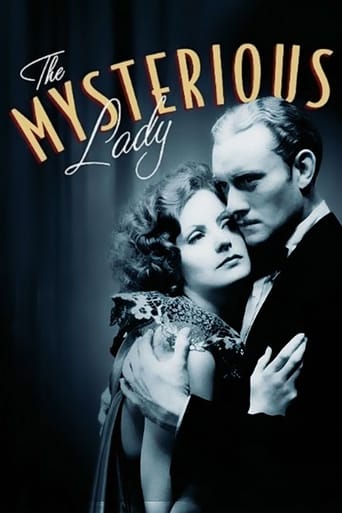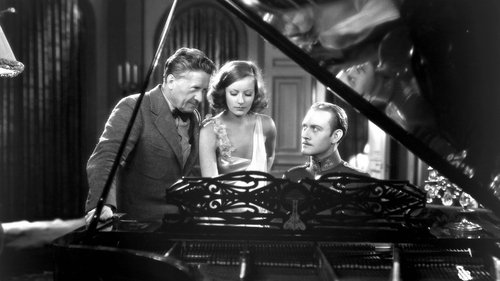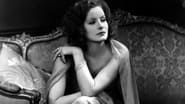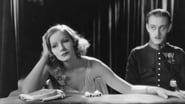Marcin Kukuczka
Have you ever been touched by the glimpse of perfection on screen? I suppose not if you are a buff of 'modern' thrillers that boast technical effects, but, unfortunately, lack any basics of subtlety. Anyone who longs for charm of good old days should decide to see at least one Garbo movie. And it does not have to be her top classic film like NINOTCHKA where Garbo memorably laughs, ANNA Christie where she adorably reveals the sound of her voice, or even GRAND HOTEL where she memorably says her iconic words "I want to be alone", but THE MYSTERIOUS LADY where she so brilliantly seduces. But what is, in fact, THE MYSTERIOUS LADY after all these years except for the fact it is one of the last silents Garbo made. In spite of the fact that THE MYSTERIOUS LADY is made by the talented yet underrated director of silent BEN HUR (1925), Fred Niblo, and based upon the novel WAR IN THE DARK by Ludwig Wolff, that is, for many, not at all the movie's strongest point. The content of a spy's determination between the choice of serving the country in lie or the choice of offering a genuine love to a man is memorably resembled in Garbo's famous talkie MATA HARI (1931). The entire investigation depicted in the film also appears to be of little importance. The real charm of THE MYSTERIOUS LADY lies in its stunning cinematography by great William H. Daniels, impressive lighting, memorable moments and, foremost, excellent cast......and at this moment, whilst analyzing the film from this perspective, we get Greta Garbo, one of, if not, the best actress that cinema could ever have, neither Garbo alone nor with her beloved John Gilbert but with equally lovable Conrad Nagel. The couple of Tania, a seductive spy, and Karl, a lovable captain, of a singer and a pianist are excellent. While Nagel crafts the role skillfully as a lover and a captain experiencing bitter military career, Garbo uses her two most powerful weapons: charm and talent. She seduces like in MATA HARI, and, moreover, she seduces silently and ... mysteriously. Their scenes are, symbolically, based upon hand and mouth (two body parts which resemble the subtle desire), upon act and affection, giving and taking. The moment worth particular attention is, perhaps the most famous scene of this movie, when Garbo lights up the candles and the camera is directed towards her face. And here, again, great thanks to William H. Daniels who photographed Garbo in an extraordinarily subtle manner. Another memorable scene is the one at the theater: how lovely it is to see the Austrian captain whose blood runs faster in veins at the sight of a delicious Russian beauty. I was mesmerized by the magic stream sequence where I found the very essence of silent picture: the delicacy it portrays and the visual experience it offers.Among the supporting cast, Gustav Von Seyfferlitz as Boris is well worth attention. The German actor who appeared in some other Garbo films as well, perfectly portrays a dominant man, someone powerful, stylish, calm who behaves in a terribly masterful manner. My friend who was watching the movie with me called him: "a macho in elegant clothes." Modern language, as it may seem, there is some truth in this.In short, I highly recommend this movie not only to silent movie buffs, but to all viewers who perceive the cinema from a more open minded perspective. If you open yourself to forgotten charm and lost magnificence of yore, THE MYSTERIOUS LADY may truly make your day.Such a little thought at the end: It seems that silent cinema is no longer appreciated, Garbo's beauty no longer valid, the charm of great motion pictures no longer admired, so are we left merely with nostalgia? No, not at all as long as there are still people who cherish these movies. They mysteriously bring its lovers into a beautiful world where you can sit in your chair at the fireplace, take a glass of champagne and drink a toast to the eyes and lips, to the glorious face of a seductive silent beauty that cinema once had.
ancientnut
A memorable tale of romance, espionage, and suspense with a luminous Greta Garbo as Tania, a Russian Mata Hari, and Conrad Nagel as Karl, the Austrian officer who falls under her spell. The film is flawlessly directed by the under-rated Fred Niblo (Blood and Sand, The Temptress), who adds sparkling effects that had me tracking back to watch them again.If you believe that sensuality in silent films was implied or off-screen, watch the scene on the TCM Archives DVD in chapter 4, 18:20-19:40. In Tania's home, Karl grabs her and begins to kiss her, but she pushes him away. He bows his head in shame and prepares to leave. Standing in the doorway, he apologizes to her. She motions to him to come to her and an expression of joy and excitement lights up his face. He walks to her as she stands with her left hand cupping her left breast. He kisses her extended right hand, places his right hand on the hand she holds over her breast, and they dive into a passionate kiss. Steamy stuff indeed for 1928! The surprising plot twists in the final 10 minutes had me laughing in amazement right up to the end. An excellent score by Vivek Maddala adds to the enjoyment of this cinematic gem.
MartinHafer
This is a very good silent film, though I had just watched two other Greta Garbo films that were incredibly similar to this one--as she plays the vamp in all three! I can't blame Ms. Garbo for this, as MGM definitely type-cast her despite her objections. In fact, she was so irritated by this theme that she went on strike to try to force the studio to give her different roles. But, considering that the public loved the films and they were all very successful, MGM wasn't about to mess with a tried-and-true formula. OF the three movies in the set, in THE MYSTERIOUS LADY, Garbo wasn't as evil she was in FLESH AND THE DEVIL or as nice as she was in THE TEMPTRESS. Instead, she played an initially evil spy who over the course of the film has a gradual change of heart. Considering how badly and abruptly the change of heart occurred in FLESH AND THE DEVIL, this one was much more believable and welcome.As I said above, the three films are all very derivative--all with a roughly identical theme. This one also has the added benefit of having almost the exact theme as her later film, MATA HARI. Wow--what a lot of repetition in Garbo's career. No wonder she retired so young! She was probably just sick of the "same old same old"! Now how much you like this film is probably heavily dependent on if you like this sort of theme or if you've seen Garbo films before. I, for one, hate all this repetition, but also realize that on its own this STILL is a very good movie. While not as deliciously evil and twisted as FLESH AND THE DEVIL, the overall film is much more even and satisfying since its happy ending is at least credible. And, the production values and acting are excellent--MGM really pulled out all stops to make this film.
Ron Oliver
A young Austrian officer doesn't realize how profoundly THE MYSTERIOUS LADY he meets at the Opera will change his life.Greta Garbo's entrancing beauty is the main attraction in this Silent drama from MGM. Her face alone would have assured her a place in film history. But this film, which deals with World War One espionage, has other things to offer, including a good performance from Conrad Nagel as Garbo's co-star. The story is a wee bit ludicrous, but MGM graced the film with excellent production values as befits a movie starring their enormously popular star. (The idyllic afternoon sequence shared between the two lovers is especially commendable.) The plot does have some fair degree of excitement and should not disappoint the typical viewer.Ably filling smaller roles are Gustav von Seyffertitz as the evil Russian spymaster and Edward Connelly as the head of the Austrian Secret Service, who also happens to be Nagel's uncle. Movie mavens will recognize an unbilled big Russ Powell as a rain-drenched carriage driver.This silent film has been given a fine orchestral background score by Vivek Maddala.













